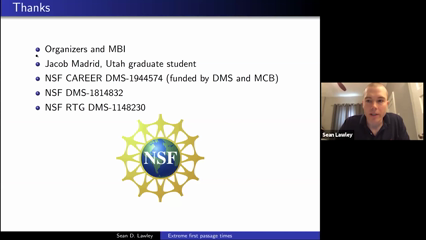MBI Videos
Sean Lawley
-
 Sean LawleyWhy do 300 million sperm cells search for the oocyte in human fertilization when only a single sperm cell is necessary? Why do 1000 calcium ions enter a dendritic spine when only two ions are necessary to activate the relevant Ryanodine receptors? The seeming redundancy in these and many other biological systems can be understood in terms of extreme first passage time (FPT) theory.
Sean LawleyWhy do 300 million sperm cells search for the oocyte in human fertilization when only a single sperm cell is necessary? Why do 1000 calcium ions enter a dendritic spine when only two ions are necessary to activate the relevant Ryanodine receptors? The seeming redundancy in these and many other biological systems can be understood in terms of extreme first passage time (FPT) theory.
While FPT theory is often used to estimate timescales in biology, the overwhelming majority of studies focus on the time it takes a given single searcher to find a target. However, in many scenarios the more relevant timescale is the FPT of the first searcher to find a target from a large group of searchers. This so-called extreme FPT depends on rare events and is often orders of magnitude faster than the FPT of a given single searcher. In this talk, we will explain recent results in extreme FPT theory and show how they modify traditional notions of diffusion timescales.
